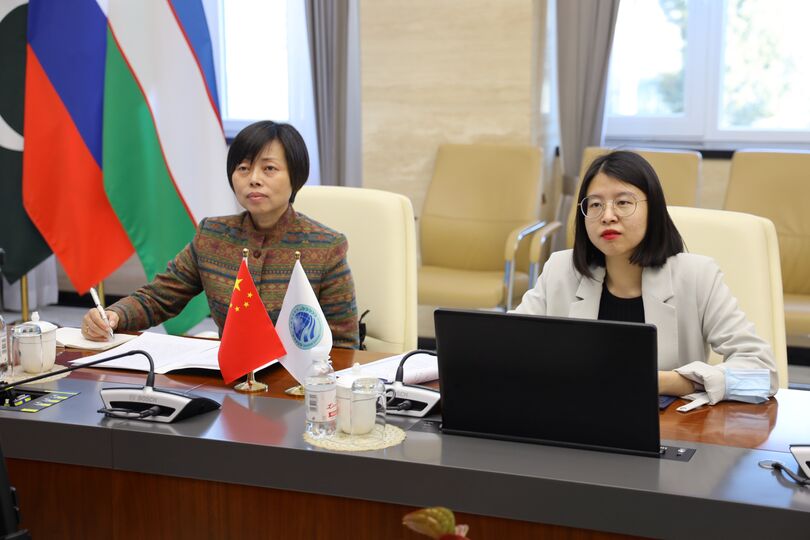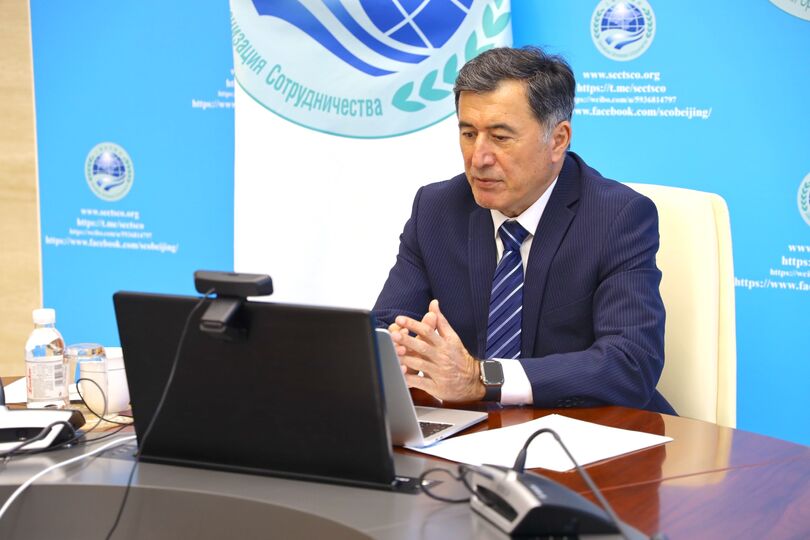On 22 February 2021, SCO Secretary-General Vladimir Norov attended the online opening ceremony of the SCO Friendship and Cooperation Centre in Tajikistan.
In his welcoming remarks, SCO Secretary-General Vladimir Norov praised the decision of Emomali Rahmon, the President of the Republic of Tajikistan, to open the centre, which aims to expand cooperation and friendship between the SCO member states and to strengthen long-time traditions of harmonious coexistence between various ethnic groups and religions.
Speaking about the fundamental significance of such concepts as friendship and cooperation, the SCO Secretary-General noted that SCO countries were united by a multitude of objective factors and causes forming a solid foundation for the successful development of mutually beneficial relations.
"Our countries and nations are linked by numerous historical and cultural links, a community of rich long-time traditions, customs and a cultural legacy, by spiritual, ethnic and religious proximity, by the similarity of languages and by strong and unbreakable neighbourly relations.
"Present-day realities unequivocally confirm the need for joint efforts by our countries' government and public organisaitons to preserve the SCO space as a stable, safe and prosperous region for future generations.
"The SCO Development Strategy until 2025 underscores the fact that the SCO member states will facilitate the development of cultural and humanitarian contacts between non-governmental, non-commercial organisations and between citizens of member states, and the development of intra-civilisational dialogue involving observer states and SCO dialogue partners," Mr Norov noted.
At the same time, it was emphasised that the creation of neighbourliness, friendship and cooperation committees or any other mechanisms with similar functions in the SCO region could facilitate this process.
Mr Norov recalled that, in their Moscow Declaration, passed at the 10 November 2020 SCO Summit, member states underlined the significance of public diplomacy in forging public trust, strengthening mutual understanding and expanding cultural and humanitarian ties within the SCO framework. In this document, the parties noted the activities of China's SCO Committee on Neighbourliness, Friendship and Cooperation and of the SCO Public Diplomacy Centre in Tashkent, as well as the Kyrgyz Republic's initiative on establishing the SCO's Cultural Integration Centre.
In this connection, the establishment of practical cooperation between similar agencies in Tashkent, Dushanbe, Beijing, Bishkek and the capitals of other SCO countries will generate major synergy and strengthen the institutional foundations of cultural and humanitarian cooperation within the SCO, the world's largest regional organisation, the SCO Secretary-General noted. This will, doubtless, strengthen mutual trust, interethnic and inter-religious accord, friendship and neighbourliness between the SCO countries and nations and will also expand cooperation between civil society institutions and media outlets.
He focused on the topicality and symbolic nature of opening this centre in Tajikistan.
The SCO Secretary-General emphasised the fact that Tajikistan's third chairmanship of the Organisation, under the motto "20 years of SCO: Cooperation for Stability and Prosperity," coincided with the SCO's 20th anniversary. The launch of the Centre as a new venue for cultural and humanitarian cooperation fully reflects the striving of Tajikistan's chairmanship to make a worthy contribution to SCO development.
Mr Norov noted that the opening of the Centre during the Year of SCO Culture constituted a crucial contribution by the Republic of Tajikistan to the expansion of cultural and humanitarian cooperation. This would make it possible to activate the immensely rich cultural, historical, spiritual, moral, artistic and aesthetic potential and heritage of the SCO nations to the maximum possible extent.
According to the SCO Secretary-General, the pandemic has revealed that the coronavirus pays no heed to state borders, and that it is the common enemy of all nations worldwide. In this connection, he voiced confidence that there was no alternative to joint international cooperation based on the principles of friendship, mutual assistance and neighbourliness while organising an effective struggle against the pandemic.
In conclusion, Mr Norov voiced confidence that the SCO Friendship and Cooperation Centre in Tajikistan would work hard and implement interesting, useful and comprehensive projects and ideas. He noted the SCO Secretariat's readiness to provide all-round assistance in addressing the new agency's tasks.
Kabuljon Sabirov, Director of the SCO Friendship and Cooperation Centre in Uzbekistan, also spoke at the opening ceremony. In his remarks, he noted that the initiative to establish this important mechanism within the Shanghai Cooperation Organisation's framework was quite topical, and that it met the interests of the sustainable and steady socioeconomic development of the peoples of the SCO countries. Today, the SCO countries are actively involved in further expanding intra-civilisational and inter-religious dialogue, while relying on the Shanghai spirit's principles.
Mr Sabirov expressed hope that the work of the SCO Friendship and Cooperation Centre in Tajikistan would help further expand diverse cooperation between the Organisation's member countries, strengthening the spirit of mutual trust, friendship, neighbourliness, and inter-ethnic and inter-religious accord.
He voiced readiness to help draft and implement joint projects and organise science and educational events.
In turn, Zheng Wei, General Secretary of China's SCO Committee on Good-Neighbourliness, Friendship and Cooperation, also congratulated the Tajik party on opening the SCO Friendship and Cooperation Centre.
In turn, Zheng Wei, General Secretary of China's SCO Committee on Good-Neighbourliness, Friendship and Cooperation, also congratulated the Tajik party on opening the SCO Friendship and Cooperation Centre.

By establishing this Centre, Tajikistan has made an important contribution to strengthening friendship among nations and expanding neighbourliness and friendship between the peoples of the SCO countries, she noted.
She voiced her readiness to expand cooperation with the Centre and to organise various joint events, including the SCO Public Diplomacy Forum, the SCO's Traditional Medicine Forum, the Exhibition of Children's Drawings and Books from SCO Countries, the Festival of SCO Countries' Films, the Think Tanks Seminar, the Artificial Intelligence Competition involving young people from the SCO countries, and the International Marathon, as well as Yoga and Tai Chi Chuan events.
She expressed confidence that close cooperation between agencies in Tashkent, Dushanbe and the Committee in Beijing would strengthen the foundation of friendship and mutual understanding and would facilitate the SCO's continuous development in order to build a more close-knit SCO community with a common destiny.
"Our strength lies in cohesion. All SCO countries are free to take part in public diplomacy cooperation. We invite all parties to engage in close cooperation and joint development," Ms Zheng Wei noted.
Attendees included Sharifi Latifzod, Assistant to the President of the Republic of Tajikistan, ambassadors of the SCO countries to Tajikistan and representatives from Tajikistan's Foreign Ministry.
Other attendees also noted the importance of establishing the Centre and voiced their readiness to expand cooperation with the SCO Secretariat and the Centre for the benefit of the SCO countries' peoples and to jointly strengthen the Shanghai spirit.
